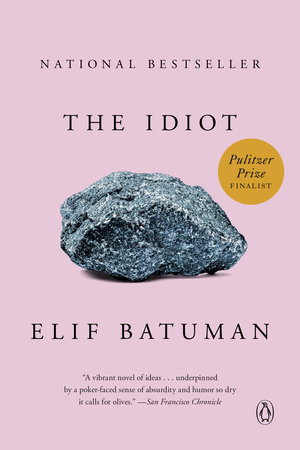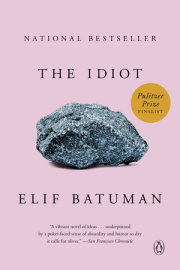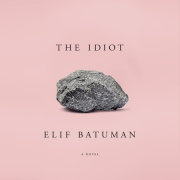Fall
I didn’t know what email was until I got to college. I had heard of email, and knew that in some sense I would “have” it. “You’ll be so fancy,” said my mother’s sister, who had married a computer scientist, “sending your e . . . mails.” She emphasized the “e” and paused before “mail.”
That summer, I heard email mentioned with increasing frequency. “Things are changing so fast,” my father said. “Today at work I surfed the World Wide Web. One second, I was in the Metropolitan Museum of Art. One second later, I was in Anıtkabir.” Anıtkabir, Atatürk’s mausoleum, was located in Ankara. I had no idea what my father was talking about, but I knew there was no meaningful sense in which he had been “in” Ankara that day, so I didn’t really pay attention.
On the first day of college, I stood in line behind a folding table and eventually received an email address and temporary password. The “address” had my last name in it—Karadağ, but all lowercase, and without the Turkish
ğ, which was silent. From an early age I had understood that a silent
g was funny. “The
g is silent,” I would say in a weary voice, and it was always hilarious. I didn’t understand how the email address was an address, or what it was short for. “What do we do with this, hang ourselves?” I asked, holding up the Ethernet cable.
“You plug it into the wall,” said the girl behind the table.
Insofar as I’d had any idea about it at all, I had imagined that email would resemble faxing, and would involve a printer. But there was no printer. There was another world. You could access it from certain computers, which were scattered throughout the ordinary landscape, and looked no different from regular computers. Always there, unchanged, in a configuration nobody else could see, was a glowing list of messages from all the people you knew, and from people you didn’t know, all in the same letters, like the universal handwriting of thought or of the world. Some messages were formally epistolary, with “Dear” and “Sincerely”; others telegraphic, all in lowercase with missing punctuation, like they were being beamed straight from people’s brains. And each message contained the one that had come before, so your own words came back to you—all the words you threw out, they came back. It was like the story of your relations with others, the story of the intersection of your life with other lives, was constantly being recorded and updated, and you could check it at any time.
You had to wait in a lot of lines and collect a lot of printed materials, mostly instructions: how to respond to sexual harassment, report an eating disorder, register for student loans. They showed you a video about a recent college graduate who broke his leg and defaulted on his student loans, proving that the budget he drew up was no good: a good budget makes provisions for debilitating injury. The bank was a real bonanza, as far as lines and printed materials were concerned. They gave you a free dictionary. The dictionary didn’t include “ratatouille” or “Tasmanian devil.”
On the staircase approaching my room, I could hear tuneless singing and the slap of plastic slippers. My new roommate, Hannah, was standing on a chair, taping a sign that read Hannah Park’s Desk over her desk, chanting monotonously along with Blues Traveler on her Discman. When I came in, she turned in a pantomime of surprise, pitching to and fro, then jumped noisily to the floor and took off her headphones.
“Have you considered mime as a career?” I asked.
“
Mime? No, my dear, I’m afraid my parents sent me to Harvard to become a surgeon, not a mime.” She blew her nose loudly. “Hey—
my bank didn’t give me a dictionary!”
“It doesn’t have ‘Tasmanian devil,’ ” I said.
She took the dictionary from my hands, rifling the pages. “It has plenty of words.”
I told her she could have it. She put it on the shelf next to the dictionary she had gotten in high school, for being the valedictorian. “They look good together,” she said. I asked if her other dictionary had “Tasmanian devil.” It didn’t. “Isn’t the Tasmanian devil a cartoon character?” she asked, looking suspicious. I showed her the page in my other dictionary that had not just “Tasmanian devil,” but also “Tasmanian wolf,” with a picture of the wolf glancing, a bit sadly, over its left shoulder.
Hannah stood very close to me and stared at the page. Then she looked right and left and whispered hotly in my ear, “That music has been playing all day long.”
“What music?”
“Shhh—stand absolutely still.”
We stood absolutely still. Faint romantic strings drifted from under the door of our other roommate, Angela.
“It’s the sound track for
The Last of the Mohicans,” whispered Hannah. “She’s been playing it all morning, since I got up. She’s just been sitting in there with the door shut, playing the tape over and over again. I knocked and asked her to turn it down but you can still hear it. I had to listen to my Discman to drown her out.”
“It’s not that loud,” I said.
“But it’s just weird that she sits
there like that.”
Angela had gotten to our three-person, two-bedroom suite at seven the previous morning and taken the single bedroom, leaving Hannah and me to share the one with bunk beds. When I got there in the evening, I found Hannah storming around in a fury, moving furniture, sneezing, and shouting about Angela. “I never even saw her!” Hannah yelled from under her desk. She suddenly succeeded in detaching two things she had been pulling at, and banged her head. “OWW!” she yelled. She crawled out and pointed wrathfully at Angela’s desk. “These books? They’re fake!” She seized what looked like a stack of four leather-bound volumes, one with
The Holy Bible printed on the spine, shook it under my nose, and slammed it down again. It was a wooden box. “What’s even in there?” She knocked on the Bible. “Her last testament?”
“Hannah, please be gentle with other people’s property,” said a soft voice, and I noticed two small Koreans, evidently Hannah’s parents, sitting in the window seat.
Angela came in. She had a sweet expression and was black, and was wearing a Harvard windbreaker and a Harvard backpack. Hannah immediately confronted her about the single room.
“Hmm, yeah,” Angela said. “It’s just I got here really early and I had so many suitcases.”
“I kind of noticed the suitcases,” said Hannah. She flung open the door to Angela’s room. A yellowed cloth and a garland of cloth roses had been draped over the one tiny window, and in the murk stood four or five human-sized suitcases.
I said maybe we could each have the single room for a third of the year, with Angela going first. Angela’s mother came in, dragging another suitcase. She stood in the doorway to Angela’s room. Her body filled the entire doorway. “It is what it is,” she said.
Hannah’s father stood up and took out a camera. “First college roommates! That’s an important relationship!” he said. He took several pictures of Hannah and me but none of Angela.
Hannah bought a refrigerator for the common room. She said I could use it if I bought something for the room, too, like a poster. I asked what kind of poster she had in mind.
“Psychedelic,” she said.
I didn’t know what a psychedelic poster was, so she showed me her psychedelic notebook. It had a fluorescent tie-dyed spiral, with purple lizards walking around the spiral and disappearing into the center.
“What if they don’t have that?” I asked.
“Then a photograph of Albert Einstein,” she said decisively, as if it were the obvious next choice.
“Albert Einstein?”
“Yeah, one of those black-and-white pictures. You know: Einstein.”
The campus bookstore turned out to have a huge selection of Albert Einstein posters. There was Einstein at a blackboard, Einstein in a car, Einstein sticking out his tongue, Einstein smoking a pipe. I didn’t totally understand why we had to have an image of Einstein on the wall. But it was better than buying my own refrigerator.
The poster I got was no better or worse than the other Einstein posters in any way that I could see, but Hannah seemed to dislike it. “Hmm,” she said. “I think it’ll look good there.” She pointed to the space over my bookshelf.
“But then
you can’t see it.”
“That’s okay. It goes best there.”
From that day on, everyone who happened by our room—neighbors wanting to borrow stuff, residential computer staff, student council candidates, all kinds of people to whom my small enthusiasms should have been a source of little or no concern—went out of their way to disabuse me of my great admiration for Albert Einstein. Einstein had invented the atomic bomb, abused dogs, neglected his children. “There were many greater geniuses than Einstein,” said a guy from down the hall, who had stopped by to borrow
my copy of Dostoevsky’s
The Double. “Alfred Nobel hated mathematics and didn’t give the Nobel Prize to any mathematicians. There were many who were more deserving.”
“Oh.” I handed him the book. “Well, see you around.”
“Thanks,” he said, glaring at the poster. “This is the man who beats his wife, forces her to solve his mathematical problems, to do the dirty work, and he denies her credit. And you put his picture on your wall.”
“Listen, leave me out of this,” I said. “It’s not really my poster. It’s a complicated situation.”
He wasn’t listening. “Einstein in this country is synonymous with genius, while many greater geniuses aren’t famous at all. Why is this? I am asking you.”
I sighed. “Maybe it’s because he’s really the best, and even jealous mudslingers can’t hide his star quality,” I said. “Nietzsche would say that such a great genius is
entitled to beat his wife.”
That shut him up. After he left, I thought about taking down the poster. I wanted to be a courageous person, uncowed by other people’s dumb opinions. But what was the dumb opinion: thinking Einstein was so great, or thinking he was the worst? In the end, I left the poster up.
Hannah snored. Everything in the room that wasn’t a solid block of wood—the windowpanes, the bed girders, the mattress springs, my rib cage—vibrated in sympathy. It did no good to wake her up or roll her over. She just started again a minute later. If she was asleep, I was by definition awake, and vice versa.
I convinced Hannah that she had obstructive sleep apnea, which was depriving her brain cells of oxygen and compromising her chances of getting into a top-ten medical school. She went to the campus health center and came back with a box of adhesive strips that were supposed to prevent snoring by sticking to your nose. A photograph on the box showed a man and a woman gazing into the distance, wearing matching plastic nose strips, a breeze ruffling the woman’s hair.
Hannah pulled her nose up from the side, and I smoothed the strip in place with my thumbs. Her face felt so small and doll-like that I felt a wave of tenderness toward her. Then she started yelling about something, and the feeling passed. The nose strips actually worked, but they gave Hannah sinus headaches, so she stopped using them.
In the long days that stretched between even longer nights, I stumbled from room to room taking placement tests. You had to sit in a basement writing essays about whether it was better to be a Renaissance person or a specialist. There was a quantitative reasoning test full of melancholy word problems—“The graph models the hypothetical mass in grams of a broiler chicken up to eighty weeks of age”—and every evening was some big meeting where you sat on the floor and learned that you were now a little fish in a big sea, and were urged to view this circumstance as an exhilarating challenge rather than a source of anxiety. I tried not to give too much weight to the thing about the fish, but after a while it started to get me down anyway. It was hard to feel cheerful when someone kept telling you you were a little fish in a big sea.
My academic adviser, Carol, had a British accent and worked at the Office of Information Technologies. Twenty years ago, in the 1970s, she had received a master’s degree from Harvard in Old Norse. I knew that the Office of Information Technologies was where you mailed your telephone bill each month. Other than that, its sphere of activity was mysterious. How was Old Norse involved? On the subject of her work, Carol said only, “I wear many hats.”
Hannah and I both caught a terrible cold. We took turns buying cold medicine and knocked it back like shots from the little plastic cup.
When it came time to choose classes, everyone said it was of utmost importance to apply to freshman seminars, because otherwise it could be years before you had a chance to work with senior faculty. I applied to three literature seminars and got called in for one interview. I reported to the top floor of a cold white building, where I shivered for twenty minutes on a leather sofa under a skylight wondering if I was in the right place. There were some strange newspapers on the coffee table. That was the first time I saw the
Times Literary Supplement. I couldn’t understand anything in the
Times Literary Supplement.
A door opened and the professor called me in. He extended his hand—an enormous hand on an incredibly skinny, pale wrist, further dwarfed by a gigantic overcoat.
“I don’t think I should shake your hand,” I said. “I have this cold.” Then I had a violent fit of sneezing. The professor looked startled, but recovered quickly. “Gesundheit,” he said urbanely. “I’m sorry you aren’t feeling well. These first days of college can be rough on the immune system.”
“So I’m learning,” I said.
“Well, that’s what it’s all about,” he said. “Learning! Ha, ha.”
“Ha, ha,” I said.
“Well, let’s get down to business. From your application, you seem to be very creative. I enjoyed your creative application essay. My only concern is that you realize this seminar is an academic class, not a creative class.”
“Right,” I said, nodding energetically and trying to determine whether any of the rectangles in my peripheral vision was a box of tissues. Unfortunately, they were all books. The professor was talking about the differences between creative and academic writing. I kept nodding. I was thinking about the structural equivalences between a tissue box and a book: both consisted of slips of white paper in a cardboard case; yet—and this was ironic—there was very little functional equivalence, especially if the book wasn’t yours. These were the kinds of things I thought about all the time, even though they were neither pleasant nor useful. I had no idea what you were supposed to be thinking about.
Copyright © 2017 by Elif Batuman. All rights reserved. No part of this excerpt may be reproduced or reprinted without permission in writing from the publisher.








